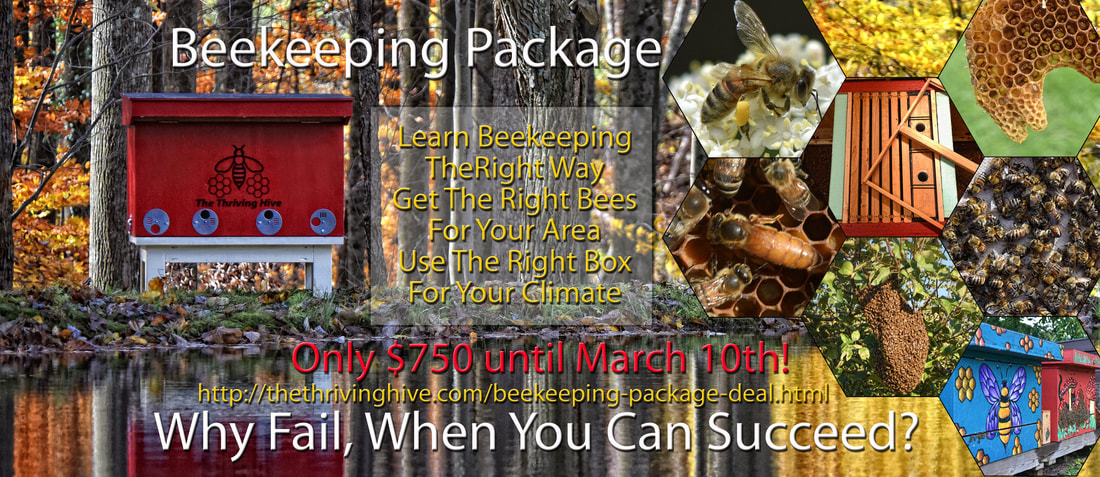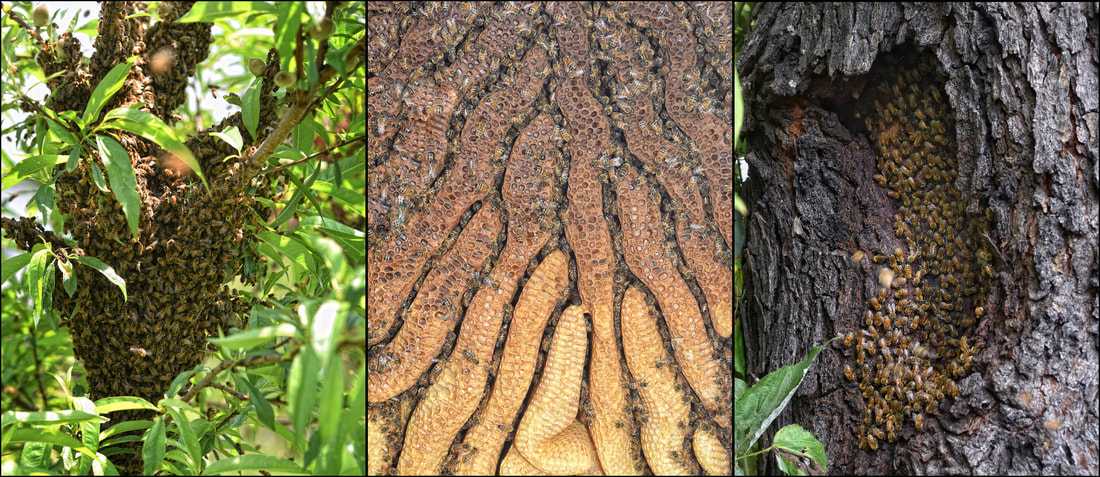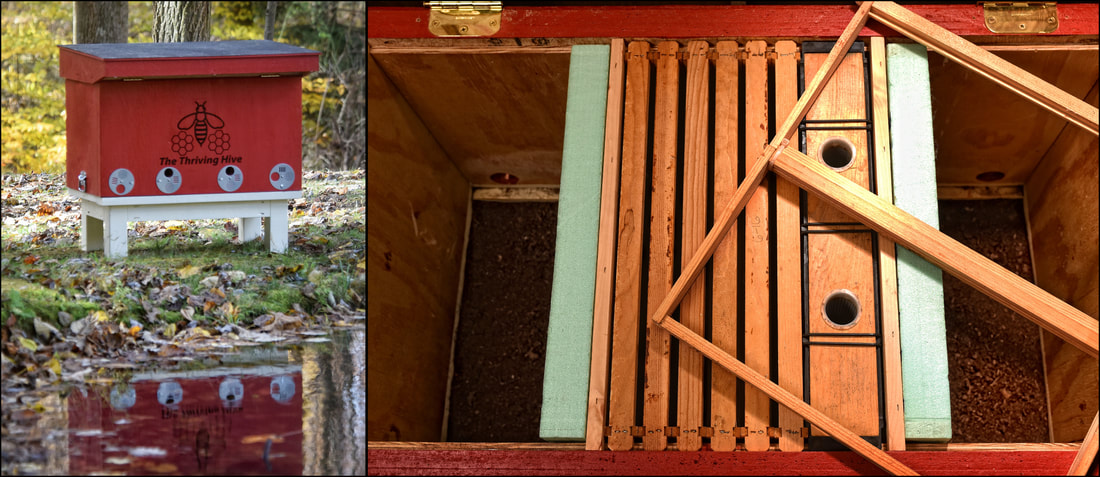You're Only Helping the Bees, if Your Bees Live!
Most first year beekeepers fail to keep their bees alive the first year...and the second...and many time the third year too! The top three reasons why they fail are the 3 reasons you should take this package if you are getting started in beekeeping!
1. They don't learn enough before they start, and have a lack of education/direction the first year to keep them on point and on track.
2. Most new beekeepers buy bees that come out of the South which simply don't do well in the North, and fail at a rate of about 95% the first year!
3. Unless you are a commercial beekeeper, there's no good reason for you to have commercial bee boxes for your bees. Hobby beekeepers don't move their boxes around, and should take advantage of this luxury to use a box better suited for the bees success!
Most survey's find that a first year beekeeper will spend about $1,400 their first year getting started. This will vary on the equipment they purchase and the number of hives they start off with, but unfortunately by the next spring most new beekeepers will be cleaning out dead bees and spending more money on replacement colonies!
Beekeeping is actually pretty easy...if you do everything right! Unfortunately in beekeeping, doing one thing wrong is almost the same as doing everything wrong, and because of this most new beekeepers fail because they didn't learn enough before they started, and didn't have the guidance the first year so they weren't making mistakes.
After their first year, many new beekeepers realize there was probably a better way to have started with, but have spent so much to do it the wrong way, that they keep trying to make it work--resulting in the same failure as they had year before.
1. They don't learn enough before they start, and have a lack of education/direction the first year to keep them on point and on track.
2. Most new beekeepers buy bees that come out of the South which simply don't do well in the North, and fail at a rate of about 95% the first year!
3. Unless you are a commercial beekeeper, there's no good reason for you to have commercial bee boxes for your bees. Hobby beekeepers don't move their boxes around, and should take advantage of this luxury to use a box better suited for the bees success!
Most survey's find that a first year beekeeper will spend about $1,400 their first year getting started. This will vary on the equipment they purchase and the number of hives they start off with, but unfortunately by the next spring most new beekeepers will be cleaning out dead bees and spending more money on replacement colonies!
Beekeeping is actually pretty easy...if you do everything right! Unfortunately in beekeeping, doing one thing wrong is almost the same as doing everything wrong, and because of this most new beekeepers fail because they didn't learn enough before they started, and didn't have the guidance the first year so they weren't making mistakes.
After their first year, many new beekeepers realize there was probably a better way to have started with, but have spent so much to do it the wrong way, that they keep trying to make it work--resulting in the same failure as they had year before.
Bee Groups, Mentors, and Teachers
Like most groups, bee groups eventually seem to get political, and today the topic that fractures groups the most is that of treating or not treating your bees. What confuses matters even more is that "treatment free" is viewed in many different ways, but what most people are looking for as treatment free isn't to do nothing to manage their hives--they just want honey that's free of chemicals (organic and inorganic alike).
Bee Groups are also comprised of many different experience levels and offer little help to people that are just getting started. The biggest complaint I've heard from people that go to groups is that they go looking for help, or a mentor, but no one is really interested in getting them on the right path. Another issue is that when at meetings they don't know what they are talking about, because bee terminology needs to be learned first to understand what's even being said!
Most new beekeepers go to bee groups in search of a "mentor", but what they are really looking for is someone that will come to their bees to help them--not realizing that a mentor is someone you do work for, and in return you gain knowledge. There are two problems with this that most new beekeepers never think about when searching out help. One is that most good beekeepers are keeping bees because they enjoy doing that work themselves, and the second is why bring in someone that will take 4 times longer to do the work for you than you can yourself--and most definitely not as well! Remember that thing about doing one thing wrong is about the same as doing everything wrong...well, most seasoned beekeepers aren't going to take the risk of that one thing wrong happen by letting a new beekeeper get in to their hives. What most learn too late is that they should have been looking for a teacher, not a mentor--although it does sound much cooler to say you have a mentor! LOL
A teacher is someone that is more likely to give you the guidance you need, because they are getting paid for the service. Seeking out a teacher, or class, will put you with others that have the same basic skill level as you do, and won't be nearly as intimidating. The problem with most classes though is they are held only in the early spring before bees are sold, to get you interested, and once bees are delivered you are on your own. Finding a teacher or class that helps you through your first full season is the best answer to keeping your bees alive, and never having to buy bees again!
Bee Groups are also comprised of many different experience levels and offer little help to people that are just getting started. The biggest complaint I've heard from people that go to groups is that they go looking for help, or a mentor, but no one is really interested in getting them on the right path. Another issue is that when at meetings they don't know what they are talking about, because bee terminology needs to be learned first to understand what's even being said!
Most new beekeepers go to bee groups in search of a "mentor", but what they are really looking for is someone that will come to their bees to help them--not realizing that a mentor is someone you do work for, and in return you gain knowledge. There are two problems with this that most new beekeepers never think about when searching out help. One is that most good beekeepers are keeping bees because they enjoy doing that work themselves, and the second is why bring in someone that will take 4 times longer to do the work for you than you can yourself--and most definitely not as well! Remember that thing about doing one thing wrong is about the same as doing everything wrong...well, most seasoned beekeepers aren't going to take the risk of that one thing wrong happen by letting a new beekeeper get in to their hives. What most learn too late is that they should have been looking for a teacher, not a mentor--although it does sound much cooler to say you have a mentor! LOL
A teacher is someone that is more likely to give you the guidance you need, because they are getting paid for the service. Seeking out a teacher, or class, will put you with others that have the same basic skill level as you do, and won't be nearly as intimidating. The problem with most classes though is they are held only in the early spring before bees are sold, to get you interested, and once bees are delivered you are on your own. Finding a teacher or class that helps you through your first full season is the best answer to keeping your bees alive, and never having to buy bees again!
Learn About Bees First
Because You Can't Keep What You Don't Understand!
The biggest mistake made in most bee classes is they teach people about beekeeping...but NEVER teach them about bees! If you don't know how a bee is supposed to live, or how they survive in the wild, you really won't understand if how you are keeping them is even good for them, or going to make it so they might survive, or probably thrive!
When you learn about bees, it gives you the ability to filter out bad information; after all, they don't have the saying "ask 10 beekeepers a question and you'll get 11 different answers" for a reason! Every beekeeper has their own way of doing things, a good teacher will help you develop your best way, and give you the tools to make the best decisions for your bees!
When you learn about bees, it gives you the ability to filter out bad information; after all, they don't have the saying "ask 10 beekeepers a question and you'll get 11 different answers" for a reason! Every beekeeper has their own way of doing things, a good teacher will help you develop your best way, and give you the tools to make the best decisions for your bees!
Better Bees Make for Better Beekeepers!
So much of your success will hinge on the quality of your bees! Where most people make their mistake here is that they are so excited and anxious about getting bees, that getting them early is more important than getting the best. Bees that are from your area are acclimated to your area, and bees that were kept here over winter already have proven themselves hardy to our crazy weather. What keeps most new beekeepers from getting the right bees is that there are more new beekeepers than there are good local bees, and good local bees don't get delivered until early May, when package bees from the south are sometimes (not wisely) delivered in early April!
Local over wintered bees have a much better start, and give you a better chance at success. These bees already are hatching out new bees when you get them, where packages it will be another month, so even though packages might come earlier, they will still put your bees further behind if that's what you choose, and that's already doing that "one thing wrong" that you are trying to avoid!
Local over wintered bees have a much better start, and give you a better chance at success. These bees already are hatching out new bees when you get them, where packages it will be another month, so even though packages might come earlier, they will still put your bees further behind if that's what you choose, and that's already doing that "one thing wrong" that you are trying to avoid!
And a Better Box Makes for Better Bees!
Before hobby beekeeping, there were only really commercial beekeepers--people that had bees for the purpose of making money--so it's no surprise that when the hobby beekeepers went looking for guidance, what they were being taught was how to keep bees commercially! Commercial beekeepers generally have many hives, very close together, and they often move the boxes many miles away for better forage or pollination contracts. Hobby beekeepers have none of these same needs, and a big part of why they don't do so well keeping bees, is that what they were taught simply wasn't a good fit for what they need.
The Thriving Hive Bee Box is made for the person that really just wants to keep bees in their back yard, or in a location that the bees are going to stay at, with no plan or need to move them. For a a more thorough description you can view the page for the box, but for now let's just keep it as the box is better for the bees because it was made for bees first, but also makes it easier for the beekeeper to inspect, manage, and succeed with!
The Thriving Hive Bee Box is made for the person that really just wants to keep bees in their back yard, or in a location that the bees are going to stay at, with no plan or need to move them. For a a more thorough description you can view the page for the box, but for now let's just keep it as the box is better for the bees because it was made for bees first, but also makes it easier for the beekeeper to inspect, manage, and succeed with!
Box, Bees & Classes
|
You will get a Thriving Hive Box, that you can't paint how you wish. Bee stand is not included.
You will get local, over-wintered bees from feral bee stock. They will be on frames ready for your box, that include brood and honey. You will get 7 months of support and classes. Meetings that will be held at 6:30 PM, the first Sunday of every month starting in March, and Ending in November. April 7, 2 hour class on bee terminology, equipment, and how bees live May 5, 2 hour class on swarms, bee forage, and bee box placement June 2, Meeting on how to manage your bees July 7, Meeting, teaching current bee forage, and what needs done August 4, Meeting, teaching current bee forage, and what needs done September 1, Meeting, teaching current bee forage, and what needs done October 6, Meeting, teaching current bee forage, and what needs done November 3, Meeting, are you ready for winter and what to look for |
|
Special $750 Price ONLY to March 10th, $850 Before April 7, ONLY 8 Available
The regular price for the box is $549.00, Bees $250.00, and 9 months of Classes/Meetings $250.00, that's a $1,049.00 value for a $300 savings if you act early! We also offer site inspections to those that are in the classes at an added cost, but at least one of our monthly meetings will be held in our bee yard to give more hands on experience. 2 people for each box may attend the classes. The classes will be held at a lovely little cabin just 2 miles from the town of Indiana.


